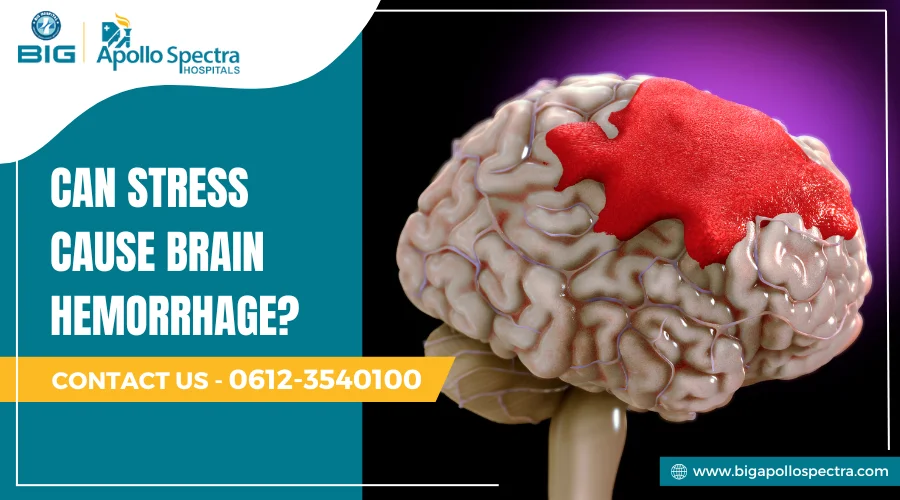Today’s fast-paced lifestyle with looming deadlines and increasing responsibilities makes it essential to understand the impact of stress on health. Most people understand that stress triggers headaches and anxiety yet fail to recognize its link to serious health problems like brain hemorrhages.
Stress hormones and environmental pressures trigger sensitive responses from the brain.
In fact, the latest medical findings demonstrate serious links between ongoing stress and neurological problems, which is especially common among people living in high-stress environments. Understanding this connection is essential for medical professionals and anyone who faces stress on an ongoing basis.
Thus, today’s blog investigates how chronic stress affects brain health and provides practical steps for prevention. Our investigation into stress and brain hemorrhage will cover how everyday pressures can affect neurological well-being.
Can Stress Cause Brain Hemorrhage? 3 Possible Connections
Medical researchers have been fascinated with the question “does stress cause brain bleed?” for many years now. In fact, research also relates stress with brain damage.
People who face chronic stress can have structural changes in their brain due to the neurotoxic effects of stress hormones, according to the findings in the Frontiers in Neuroendocrinology Journal.
Also, patients enduring constant high-stress conditions may develop weaker blood vessel walls and higher levels of inflammation, which might lead to hemorrhagic incidents. Emerging research shows that stress and brain hemorrhage share a relationship that goes beyond simple coincidence.
So, can too much stress cause brain hemorrhage? Medical research shows different physiological pathways that link excessive stress to brain issues.
1. Elevated Blood Pressure
Stress-induced increase in blood pressure creates a primary route that may lead to possible brain hemorrhage. Our body releases cortisol and adrenaline during stress, which activates the fight-or-flight response.
This natural response to stress leads to constricted blood vessels and elevated heart rate and blood pressure levels. While this response helps during brief stressful events, it becomes harmful when chronic stress keeps blood pressure high and forces blood vessels to handle constant elevated pressure.
Arterial walls gradually weaken when subjected to continuous strain, which threatens the brain’s fragile blood vessels resulting in potential ruptures or bleeding.
2. Inflammation Response
The body undergoes complex inflammatory responses due to chronic stress which most severely impacts the brain’s vascular system.
Scientific studies reveal that long-term stress raises levels of inflammatory markers including C-reactive protein and interleukins which lead to weakened blood vessel structures. The inflammatory condition produces a damaging effect that makes blood vessel walls more vulnerable to harm.
This inflammatory response paired with additional stress-related elements speeds up the deterioration of cerebral blood vessels which creates weak spots that might result in either slow brain bleed or acute hemorrhagic episodes.
3. Blood Clotting Changes
Blood coagulation changes due to stress serve as a major risk factor for brain hemorrhage. Chronic stress disrupts normal clotting processes by modifying how platelets function and changing coagulation factors.
The changes to blood clotting mechanisms produce an imbalance whereby blood becomes either excessively prone to clot formation or insufficiently capable of clotting, which results in increased blockages or bleeding risks.
The normal blood clotting process disruption becomes particularly dangerous when paired with the additional strain from high blood pressure and inflammation because this combination greatly raises the chances of brain hemorrhages.
However, it’s important to note that certain medical professionals point out that despite observed correlations, these correlations do not establish a causal relationship between stress and brain bleed incidents. Some medical experts maintain that underlying conditions like congenital vessel weakness or pre-existing aneurysms hold greater significance.
Irrespective of that, it’s important to be mindful of the signs and symptoms and know when to seek immediate medical supervision.
Recognizing the Signs
A study conducted by WHO and the International Labour Organization has identified occupational stress as a major health risk. Exposure to long working hours is the occupational risk factor with the largest attributable burden of disease.
This makes early detection of the symptoms imperative in order to prevent health risks in future. Early and timely intervention largely depends on correctly understanding the symptoms of brain hemorrhage due to stress. So, watch out for:
- Sudden, severe headaches
- Vision changes or double vision
- Difficulty speaking or understanding speech
- Unexpected weakness or numbness
- Loss of balance or coordination
The primary concern about these symptoms is that these can be easily mistaken for typical stress-related conditions, which can lead to misdiagnosis. For instance, people often misidentify severe headaches as tension headaches while they mistake vision changes for screen time related eye strain.
However, sudden appearance of these symptoms together or particularly after intense stress demands immediate medical care. Anyone experiencing these symptoms needs to promptly consult with the best neurologist doctor in Patna.
Timely intervention will not only help detect any worrisome issues but also alleviate the added stress caused due to the symptoms.
The difference between typical stress symptoms and brain hemorrhage warning signs is usually clear through the suddenness of symptom onset and how severe the symptoms are.
Prevention Tips and Things to Keep in Mind
Stress and brain health requires proactive management to minimize risks. Consider these preventive measures:
1. Regular Blood Pressure Monitoring
Regular monitoring of blood pressure functions like an alarm system for detecting possible neurological complications ahead of time. A regular monitoring routine at home or through medical appointments enables you to observe how stress impacts your body across different time periods.
Blood pressure monitoring at home should be performed consistently at the same time daily with a device that has been correctly calibrated. Document blood pressure readings and record any major stress factors or lifestyle adjustments that may have impacted your readings.
Healthcare providers find this data essential for evaluating your risk factors and modifying your treatment plans as needed.
Follow these measures to track blood pressure and minimize health risks:
- Schedule routine checks
- Maintain a blood pressure diary
- Take prescribed medications consistently
Moreover, contact your healthcare provider right away for adjustments to your treatment if you detect regular high readings during stressful events.
2. Lifestyle Modifications
The development of a stress-resistant lifestyle involves more than simple stress management techniques because it requires a holistic strategy. Physical activity through aerobic exercises maintains cardiovascular health while controlling stress hormones.
Strive to achieve 150 minutes of moderate physical activity each week through scheduled workouts. Practice everyday stress-reduction with mindfulness meditation and deep breathing.
Also, pay attention to your sleep schedule because quality sleep achieved through a regular sleep schedule supports brain health while managing stress hormones.
In summary, you should implement these adjustments into your daily routine:
- Practice daily meditation or deep breathing
- Engage in moderate exercise
- Ensure adequate sleep
If these don’t help, seek guidance from a mental health professional to create tailored strategies for managing high-stress situations.
3. Dietary Adjustments
A brain-healthy diet helps manage stress while lowering the risk of hemorrhage. Consume foods that contain omega-3 fatty acids because they reduce inflammation and maintain healthy blood vessels. Consume antioxidant-packed fruits and vegetables to protect against oxidative damage that stress produces.
Needless to mention, avoid processed foods and high salt intake because they can lead to changes in blood pressure. You can consider adding magnesium and vitamin D supplements to your regimen, but consult your healthcare provider before that.
Maintaining proper hydration throughout the day is essential because it preserves normal blood viscosity. Furthermore, those who drink coffee should keep their caffeine intake in check by consuming moderate amounts and completely abstaining from it during evening hours to preserve sleep quality.
Your dietary habits essentially require the following adjustments for better health:
- Reduce sodium intake
- Eat potassium-rich foods
- Limit caffeine and alcohol intake
After these specific measures, it becomes crucial to develop a stress management approach that fits seamlessly into your daily routine. Workplace boundary establishment along with the development of positive coping strategies and support networks should be considered.
Activities that combine physical movement with mindfulness, such as yoga or tai chi, prove especially advantageous when performed regularly. Social connections and enjoyable hobbies act as natural stress buffers, which help lessen the effects of daily stressors on your body.
Because brain hemorrhage symptoms closely resemble those of stress-related issues, it’s necessary to go for consistent medical check-ups and stay alert regarding sudden onset of symptoms.
Seek Medical Attention at Big Apollo Spectra, Patna
The connection between stress and brain hemorrhages demonstrates how proactive stress management helps protect neurological health. While current research will continue to evolve, preventive actions plus professional advice remain essential.
Big Apollo Spectra has established itself as a premier neurology hospital in Patna for all the residents in Bihar who need specialized neurological treatment. Expert neurologists deliver complete healthcare services, including preventive consultations as well as emergency medical interventions.
Also consider consulting with healthcare professionals to create an individualized stress management strategy that safeguards your brain health. Taking control of your stress levels plays a vital role not only for mental health but also for protecting neurological functions.
Schedule an appointment with a qualified medical professional to get individualized treatment options and health guidance.





